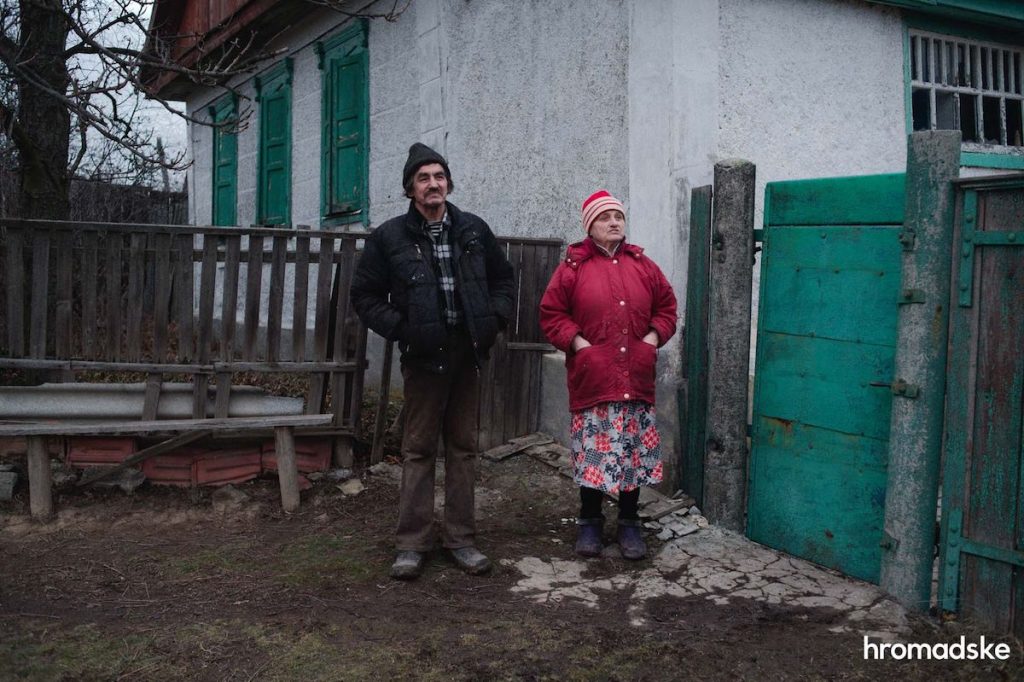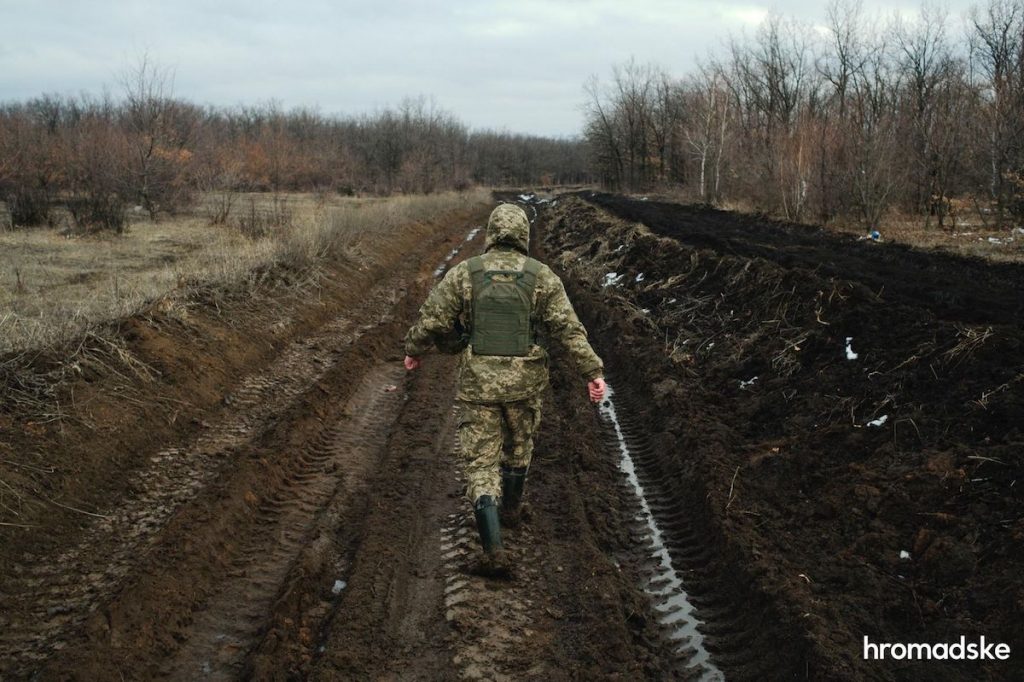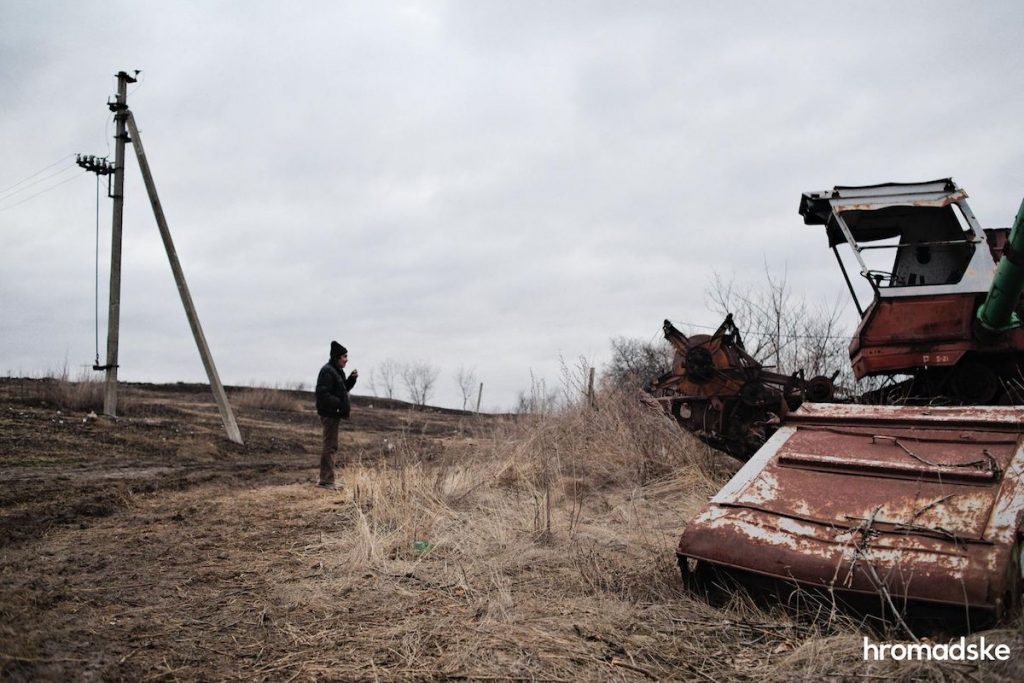‘To Europe for bread’ – the life of a Ukrainian village on the front line
The situation in eastern Ukraine is heating up, as pro-Russian formations and Russian troops continue to build up and rearrange position.
But at this time, people continue to live on the very front line. Often without basic conditions for existence. Ukraine’s Hromadske visited one such village.
“Novoaleksandrovka is arguably the worst place to live in Ukraine”, Hromadske writes. There is no gas, no electricity, and no roads. Despite all this, 10 people still live in the village which resembles life at the turn of the 20th century.
We walk two and a half kilometers along a dirt road for an hour and a half to get there.
Actually, the road was already made by the military, rolling through the forest and the field. But since it is mainly heavy military equipment that drives on this dirt road, it is impossible to drive on it, for example, in a car, even in the warm season. And after the winter, when the snow has melted, but the water has not yet dried up, your foot is ankle-deep in mud almost at every step.
Living in isolation
“See the local beauty! People used to live here. They’ve fled the war,” Vladimir says, giving us a tour of the village.
“There were barns here. A hut. A kitchen. No longer!”
Vladimir points to a path and says that the villagers walk along it to go to Europe. After a dramatic pause, he clarifies: “Well, we call Popasna Europe!”

Photo: Max Levin / hromadske
Calling territory controlled by Ukraine ‘Europe‘ is a popular joke among residents of the occupied territories. Novoaleksandrovka has never been occupied. In 2014-2018, it was in the “gray zone” – that is, between the positions of the Ukrainian army and the militants. In 2018, the Armed Forces of Ukraine took control of the village.
However, Novoaleksandrovka is still in isolation – no normal road leads to it. No transport goes here. Since 2014, there has been no electricity in the village.
There are also restrictions on entry in some other frontline villages and towns. The completely missing road is also not unique to Novoaleksandrovka.
The problems of Novoaleksandrovka are being resolved extremely slowly. Even the question of its administrative re-subordination to the village council, which is located in the controlled territory, was resolved almost two years after the Ukrainian military occupied the village. At the same time, officials promised to resolve the issue of energy supply. They still promise.
“If we are asked for a regime of silence in order to restore the power supply, then we will do everything. But so far they do not give us such a guarantee, unfortunately,” says the head of the Luhansk regional state administration Serhiy Gaidai.

Photo: Max Levin / hromadske
Hope from the Red Cross
“We live like dogs in the summer. We bought meat and ate it by evening. We bought sausage and ate it by evening. [Otherwise] in the morning we’d give it to the dog,” 57-year-old Nikolai Nikolayevich says, describing his life.
He says that the Red Cross has purchased solar panels and diesel generators for local residents. The first is enough only to charge a phone. And for the work of the second, you need fuel, which you need not only to buy, but also to bring in a canister from Popasna.
“We are trying to help them, but our help there is limited, because it is impossible to conduct economic activity there, taking into account the safety rules,” says Oleksandr Vlasenko, press secretary of the International Committee of the Red Cross in Ukraine.
“It is impossible to stimulate local entrepreneurship there, to stimulate people to cultivate the land, because it puts them in danger. Therefore, we restrict ourselves to the fact that we transfer financial aid to them on a monthly basis [to each one separately]. Also in early December, we brought in fuel that people could use to heat their homes during the cold period.”
All local residents mention the Red Cross. Unlike local or central authorities, the existence of which seems to have been forgotten here long ago.

Photo: Max Levin / hromadske
Why do they stay?
More than 100 people lived in Novoaleksandrovka before the war. Now there are only ten left
“I won’t leave the village! Who will look after it?! Who will repair it?! I am a builder myself. I will repair the roof, then I will glaze the windows” Vladimir Alekseevich says. That’s his justification for remaining.
But later he named another reason:
“I don’t abandon my home because they would rob it. That’s being honest. I once went to Europe for bread, and they plundered me!”
His main sources of income are benefits from the Red Cross and income from selling eggs to his fellow villagers.
He has three daughters, grandchildren and granddaughters. “I am a rich Buratino,” he describes himself. But he had not seen either his daughters or grandchildren for a long time – he simply does not have the means to go somewhere. They do not come, because “they heard enough shelling in 1914, that’s enough!”
A similar story is in the case of Nikolai Nikolaevich – his daughter lives in Kyiv, and his son lives in Batumi, Georgia. He himself is not going to leave.
“Who hasn’t asked me why are you leaving here,” the man says indignantly. But the question is rhetorical. Will you give me your accommodation, will you exchange with me? How much can I sell my home for? Zero. I don’t want to go with outstretched hand”.
“I was born here, I built a house to live well in retirement. So that the children-grandchildren come here. I’m not complaining about anything, I have everything. Just let me live!” he adds.
Supported by the Russian Language News Exchange


















